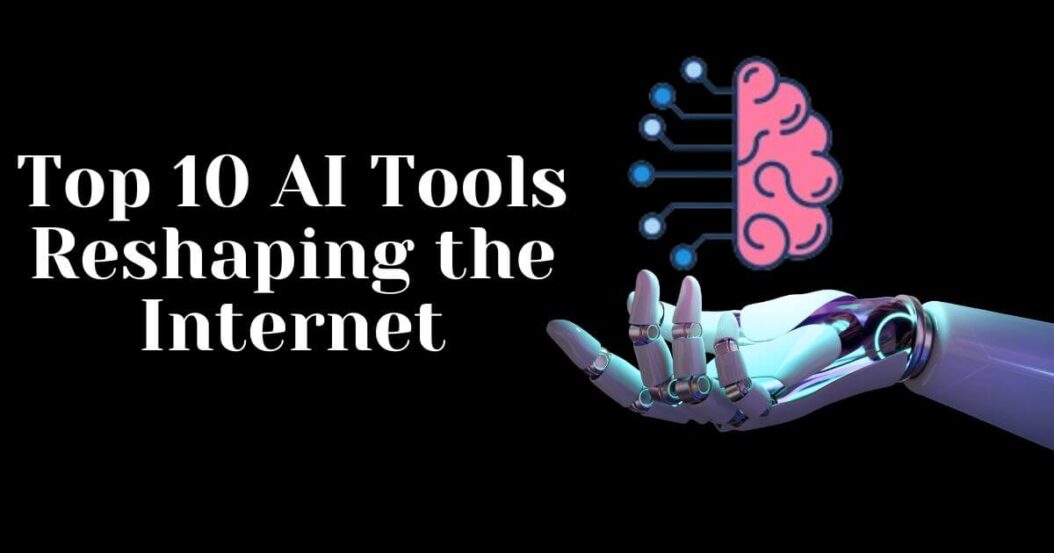The year 2023 marked a monumental shift in artificial intelligence, with numerous AI-powered tools launching to reshape how we search, create, and communicate on the internet. As the AI arms race continues between tech titans Google, Microsoft, Meta, and more, this new wave of intelligent applications aims to evolve our online experiences. Let’s look at 10 of the most game-changing AI tools that took the internet by storm in 2023:
1. CHATGPT- 4
ChatGPT The viral conversational AI chatbot from OpenAI allows generating human-like text on demand for any prompt or question. It demolished Google searches and sparked panic at schools over AI-aided cheating.
2. Midjourney
This leading AI image generator from a startup creates stunning, photorealistic visual artwork for any text description in seconds using neural networks. It enables anyone to harness advanced computer vision for creative tasks without coding. Artists embraced it to enhance workflows. Technology giant Microsoft stunned many by integrating Midjourney’s advanced image AI into Word, PowerPoint, Outlook, and Excel to boost productivity and unlock new creative possibilities through seamless accessibility.
3. You.com
You.com emerged as a new AI-powered search engine using MosaicML models to offer stunningly humanoid responses instead of just blue links. Its conversational interface aims to understand intent and context to compete against the Google juggernaut.
4. Deepmind Chimera
The versatile AI system from Alphabet’s Deepmind utilizes transformers to obtain knowledge from images, texts, and more. It can then answer robust questions at a multi-modal level, displaying deeper comprehension of the world to push boundaries.
5. Llama -2
Llama-2 represents the next iteration of an open-source large language model. As a sophisticated AI technology, Llama 2 is designed for various applications, both in research and commercial domains. Its release marks a collaborative effort, supported by a coalition of companies, individuals from the tech industry, academia, and policymakers who advocate for an open innovation approach in the realm of AI. Notably, Microsoft and Meta have deepened their partnership, with Microsoft being designated as the preferred partner for Llama 2. The model is made freely available, highlighting a commitment to widespread accessibility.
6. GitHub Copilot
The autocomplete for code tool from GitHub saves developers hours by generating entire functions and blocks of code using OpenAI’s Codex algorithm trained on public code. It boosts productivity but also raised concerns on copying licenses.
Wombo Dream Going viral on TikTok first, this web app creates unique AI-generated artworks from any song, lyrics, or text through magic experiments in psychedelic styles. The big tech-free success story empowers amateur creativity.
7. Google Bard (Gemini AI)
Google rushed its own ChatGPT rival model, Bard, to appease shareholders despite lacking sufficient training. But early factual mistakes created bad press, allowing competitors to pounce amidst the AI age while the tech giant races to catch up.
8. Grok
Grok is a conversational chatbot driven by generative artificial intelligence, created by xAI and built upon large language models (LLMs). Initiated by Elon Musk, it emerged in response to the popularity of OpenAI’s ChatGPT, a project Musk also co-founded. Grok is promoted as having a “sense of humor” and boasts direct integration with X/Twitter.
9. Imagine Meta
Imagine by Meta AI is a cutting-edge tool introduced at Meta Connect 2023, following in the footsteps of a similar beta image generator on Meta-owned WhatsApp. This generative AI image creator takes your text inputs and transforms them into vibrant and expressive pictures.
10. Seamless.AI
Seamless.AI is an AI-powered lead generation tool designed specifically for B2B sales teams. The tool uses advanced data enrichment and personalization to find accurate contact information like direct dials, mobile numbers, and emails at scale. It acts as a real-time search engine to help businesses identify and connect with relevant prospects across the web.
More AI Tools:
Stable Diffusion
Impressive open source image model with good capabilities. More accessible than DALL-E 2.
Claude (Anthropic)
Focused specifically on being helpful, harmless, and honest. Alternative to ChatGPT.
Synthesia
Generates custom synthetic video of digital avatars from text input.
Descript
Edit audio and generate podcasts with its Overdub tool.
Runway
Leading platform for deploying AI models for different media applications.
FAQs
Q: Are these AI tools accessible to small businesses?
A: Absolutely! Many of the top AI tools introduced in 2023 cater to businesses of all sizes, offering scalable solutions.
Q: How do AI tools address privacy concerns?
A: AI developers are increasingly prioritizing privacy features, ensuring that user data is handled responsibly and securely.
Q: Can AI tools be integrated into existing software systems?
A: Yes, most AI tools are designed with compatibility in mind, allowing seamless integration into various platforms.
Q: What industries have seen the most significant impact from these AI tools?
A: Industries such as healthcare, finance, and marketing have experienced transformative effects due to the implementation of AI tools.
Q: What should businesses consider when adopting AI tools?
A: Before adopting AI tools, businesses should assess their specific needs, ensure compatibility, and provide adequate training for users.
Conclusion:
So in summary, OpenAI and Anthropic lead in major text/code models. Stable Diffusion is the accessible open source leader for images. And new companies like Synthesia and Descript showcase the expanding capabilities for audio/video AI creation. Exciting times ahead!
- How to Optimize Computer Performance: Complete Guide for 2025 - June 22, 2025
- How Social Media is Changing Music Trends Worldwide in 2025 - June 21, 2025
- How to Connect Multiple Computers: Complete Guide for Home and Business Networks - June 21, 2025

